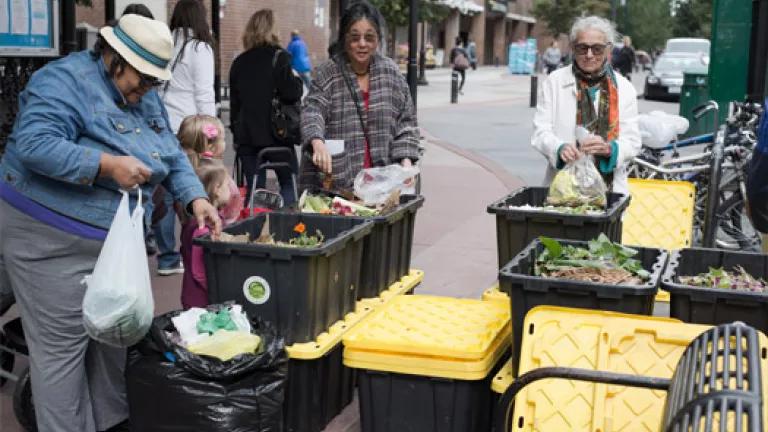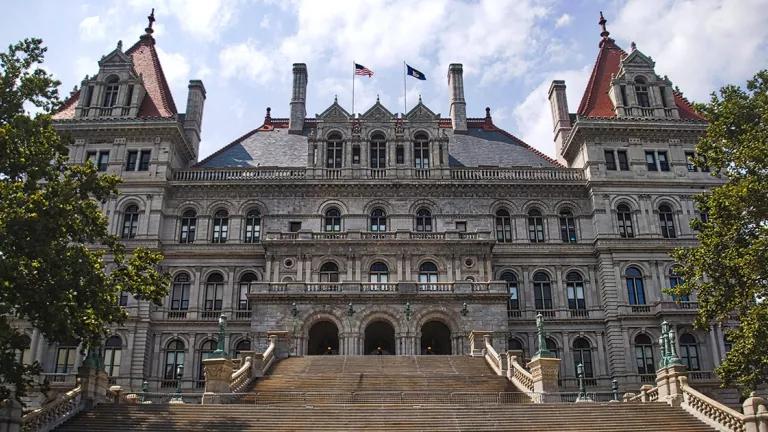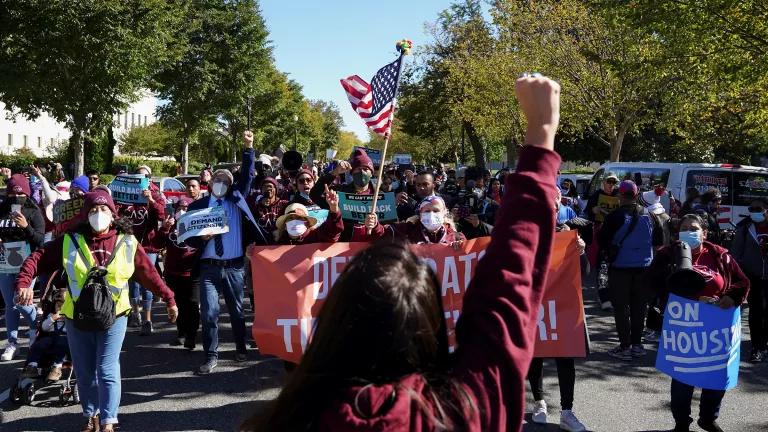NYC Council Must Restore Funds for Community Composting
Restoration of $7 million to preserve community composting and related recycling outreach and education won’t solve every waste problem in New York. But it will throw a lifeline to one of the most significant, untapped anti-pollution strategies available to local officials.

More than 170 food waste drop-off sites, including those at GrowNYC Greenmarkets, would be rescued if the Council restores community compost funding.
As the New York City Council and Mayor Bill DeBlasio hammer out the final details of their FY ’21 budget, perhaps the most sensible action they could take to curb global warming emissions and advance environmental justice is to restore $7 million to rescue the city’s organics collection Community Composting program and related recycling outreach and education initiatives.
This 11th hour action is necessary to reverse the most environmentally destructive element of the Mayor’s proposed cutbacks to the Sanitation Department’s budget—slashing $28 million for composting programs. This would scuttle the Department’s citywide voluntary curbside food waste collection program, terminate local community composting operations that provide drop-off locations for New Yorkers to sustainably dispose of their food waste and slash related recycling outreach and education efforts.
These cuts dig into bone. Organic trash—food scraps, food-soiled paper and yard waste—accounts for a full one-third of the city’s residential waste stream. The vast bulk of these materials have been sent for years to incinerators (where their high moisture content produces additional air contaminants) and landfills (where they are buried, generating methane—a very potent global warming gas). Even today, landfills are the 3rd largest source of methane emissions in the United States.
In contrast, composting trash turns organics into useful soil conditioners that can replace chemical fertilizers, stabilize soil and help it to retain water, and capture global warming carbon emissions. Mayor DeBlasio himself has touted citywide composting collection as a top environmental priority and an essential step in reaching the city’s ambitious climate goals. But the Administration’s budget proposal jumps in exactly the opposite direction.
And once these organics programs are eliminated, even if composting collections were to be reinstated down the line, the damage will have been done. The experience when the Sanitation Department cut recycling collections of plastic and glass in 2001 is illustrative. Even though the City Council restored funding the following year, the public had been confused and recycling rates never rebounded to pre-2001 levels.
The elimination of these composting programs would also mark a big step backwards on environmental justice. As Dr. Tok Michelle O. Oyewole from the New York City Environmental Justice Alliance testified at recent City Council hearings, “local scale organics processing can divert waste from being trucked to transfer stations clustered in three environmental justice communities” (North Brooklyn, the South Bronx and Southeast Queens). Effective local composting programs also reduce the amount of waste sent to landfills and incinerators, which are often located in environmental justice communities outside of New York City. And properly designed local composting operations can cut back on the amount of truck traffic from trash trucks in overburdened communities, as well as boost on-the-ground waste education efforts that benefit all New Yorkers.
Recognizing the City's difficult fiscal setting in the wake of the Coronavirus, a diverse coalition of local and citywide organizations has been pressing for restoration of at least $7 million of the proposed $28 million cuts to composting programs. These funds would enable dedicated non-profits like the Lower East Side Ecology Center, Big Reuse, Earth Matter NY, local Botanical Gardens and GrowNYC’s Greenmarkets to continue collecting food scraps from tens of thousands of city residents in all five boroughs and continue educating New Yorkers as to the benefits of composting and recycling.
With the Council appropriately planning to reallocate some of the proposed $6 billion NYPD budget to social services, youth employment, restorative justice, etc., it would take only a tiny portion of those reallocated monies to plug the $7 million hole in the city's community composting and related recycling outreach and education programs.

Composting programs can save taxpayer dollars, help community gardens in all 5 boroughs and teach NYC kids about nature.
Beyond this immediate restoration of funding, the Council should move forward with equitable legislation introduced by Councilmembers Keith Powers and Antonio Reynoso that would expand the number of drop-off locations to three in every community district. This would allow residents in all neighborhoods access to food scrap composting opportunities (and to clothing and textile recycling).
Long-term, what’s needed is enactment of a new law that would phase-in a mandatory program for the separation and curbside collection of discarded organics from every city household. That’s the route that cities like Seattle, San Francisco, Portland and Toronto have taken to advance more sustainable waste practices and also save money over the long-term for local taxpayers (in comparison to sending all of their trash to landfills).
Restoration of $7 million to preserve community composting and related recycling outreach and education won’t solve every waste problem in New York. But it will throw a lifeline to one of the most significant, untapped anti-pollution strategies available to local officials.
Today, all eyes are on Speaker Corey Johnson, a strong friend to the environment during his tenure, and his City Council colleagues. If this essential sanitation program is to be saved and expanded in the nation’s largest city, they’re the ones who will have to come to the rescue.



